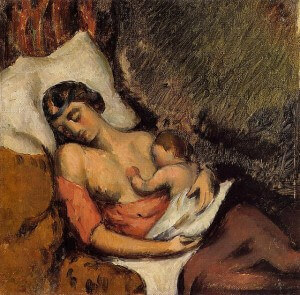One of the most important factors in neonatal health is whether the infant is breastfed. Breastfeeding is associated with a laundry list of health benefits to both the baby and the mother. It is endorsed by prominent health organization in the United States and throughout the world. Yet, there are still negative stigmas associated with the practice.
Breastfeeding is the feeding of an infant or young child with milk produced by the mother’s breast. Generally, breastfeeding refers to the child using its natural sucking reflex to draw milk directly from the mother’s breast. But, it may also refer to the practice of expressing the breast milk for the child to drink from a bottle when being cared for by others.
From ancient times until industrialization, breastfeeding was the main way to feed newborns. But, with mothers entering the workforce, it became increasingly difficult to breastfeed. In the early 1900s, breastfeeding even began to be seen in a negative light. With the advent of improved infant formula after World War II, breastfeeding fell to the wayside. It was not until the 1960s that it saw a resurgence still present today despite continued barriers to its practice.
Health Benefits of Breastfeeding
Experts suggest infants rely exclusively on their mothers’ breast milk for subsistence until six-months of age. Additionally, they recommend the child continue to be breast fed until at least two years of age while also eating age-appropriate foods.
These guidelines come strongly recommended due to the many health benefits breastfeeding has. Some of these are:
- Immune system boosts – a baby takes in antibodies that mainly target harmful microorganisms in the baby’s intestines.
- Reduced risk of childhood obesity (compared to babies fed formula).
- Improved bonding between mother and infant.
- Reduced risk of infections.
- Vaccinations mothers receive while breastfeeding pass on to the baby.
- Quicker loss of pregnancy pounds for the mother.
- Reduced risk of sudden infant death syndrome.
- Less chance of developing diabetes.
Additionally, breastfeeding is a lot less expensive than purchasing infant formula.
What Prominent Organizations Have to Say
The benefits to breastfeeding are backed up by organizations around the world:
“Extensive research using improved epidemiologic methods and modern laboratory techniques documents diverse and compelling advantages for infants, mothers, families, and society from breastfeeding and use of human milk for infant feeding,” the American Academy of Pediatrics says. “These advantages include health, nutritional, immunologic, developmental, psychological, social, economic, and environmental benefits.”
The United States Centers for Disease Control and Prevention concurs: “One of the most highly effective preventive measures a mother can take to protect the health of her infant is to breastfeed.”
“Exclusive breastfeeding (giving your baby breast milk only) is recommended for around the first six months (26 weeks) of your baby’s life,” the National Health Service advises. “After that, giving your baby breast milk alongside other food will help them continue to grow and develop. Any amount of breastfeeding has a positive effect.”
And, the World Health Organization has this to say, “The vast majority of mothers can and should breastfeed, just as the vast majority of infants can and should be breastfed. Only under exceptional circumstances can a mother’s milk be considered unsuitable for her infant.”
Continued Barriers to Breastfeeding
Despite these strong and universal calls to breastfeed, mothers still face barriers in providing their infants with the nutrition they need. One of the bigger issues is society’s norms regarding the woman’s breast. Mothers who want to feed their child in public may face ridicule or even be banished from an establishment.
Some states have passed laws guaranteeing women the right to breastfeed in public. There are also breastfeeding advocacy groups, who organize group breastfeeding events to raise awareness for the health benefits of the practice and to promote breastfeeding-friendly laws.

